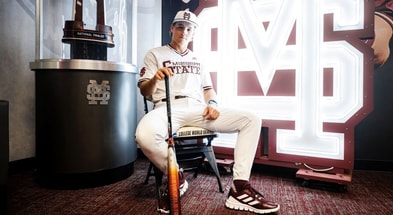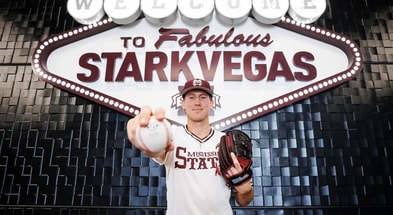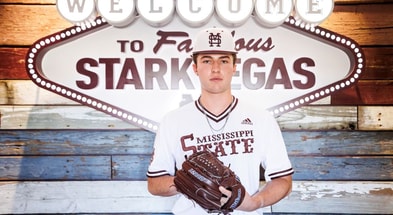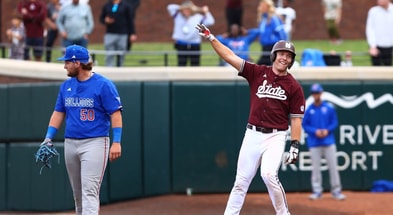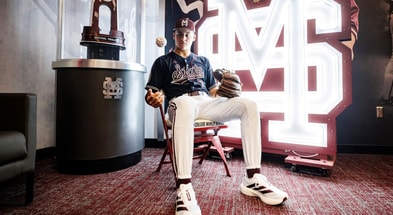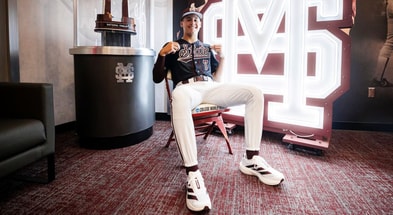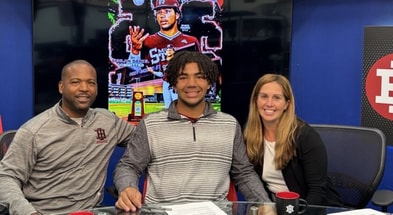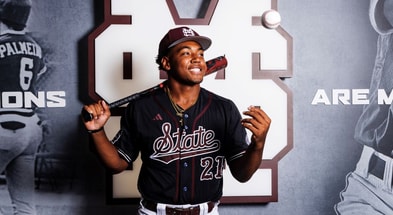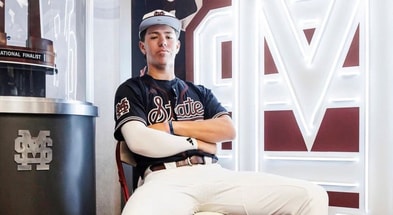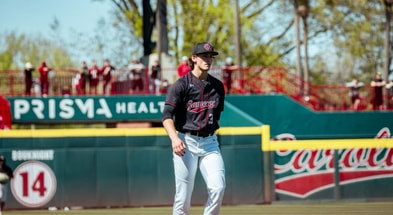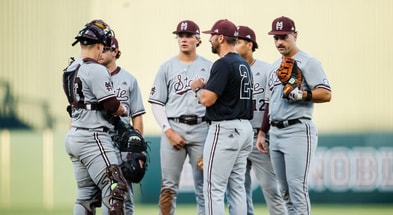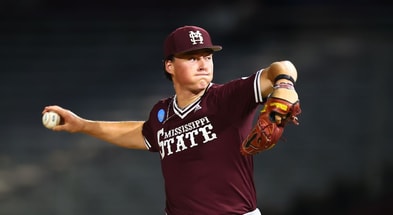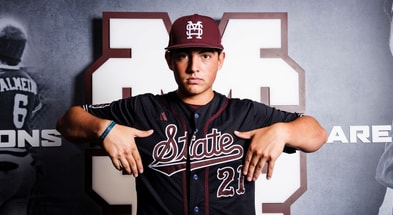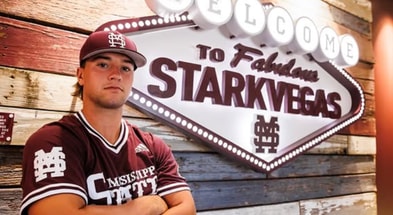Justin Parker re-energized as Diamond Dawgs hit new era
There have been a lot of changes within the Mississippi State baseball program since last fall, but there’s one part of the team that will be a steady force.
Justin Parker is the only returning staff member from the Chris Lemonis era as the pitching coach took over the program on an interim basis late last season and helped lead the Diamond Dawgs to postseason play. After his work the last two years as the State pitching coach, Parker earned an opportunity to continue his position with new coach Brian O’Connor.
Since that time, Parker has been hard at work building State’s roster in the transfer portal, retaining talented pitchers from last year’s team, developing those players and also working the recruiting trail for future classes. As fall ball has begun, Parker recently gave an update on his crew and the progress of the program under a new regime.
Question: What’s been your impressions of this team so far?
JP: “I like the work. I like the group. It’s hungry. It’s a good balance of returners, it’s a good balance of new guys. Even a lot of the new guys, it seems like there’s been familiarity. Whether it’s the guys that transferred in with coach O’Connor and his staff or guys through the transfer portal or junior college that we’ve had familiarity with. They’ve worked hard so far.”
Q: You’ve had success getting players drafted. How has that carried over in recruiting?
JP: “It’s a part of what you’re trying to do and part of your mission statement as a coach. Of course, we want to win games and put guys in position to have success, but they have aspirations and dreams. It’s part of the recruiting process and the sell as well. I think we’ve had 14 players drafted in the last two years, guys that I’m super proud of. To see them have a chance to go chase their dream is ultimately something I’m very proud of.”
Q: How did the process work with you coming back?
JP: “I think this program is as good as it gets. This community has been so good to me and my family. The history, the facilities, the kids in that locker room… Building relationships and continuity in what I’ve been able to build on the pitching staff. All of those things together and then you look at Coach O’Connor’s resume and you get a chance to meet him and hear him talk and you see all of the people that came along with him. That speaks so highly of him as a coach and as a man and his character. It’s the loyalty that those guys were willing to follow him anywhere.
“In most cases, they’ve played here on occasion, but none of them have been to the state of Mississippi. I love this place. I love the kids in the locker room. This program, this community, the fans have been so incredible to me. Then hearing his vision shared with me, it’s something I was very passionate about trying to figure out what I had to do to stay.”
Q: When you get ready to craft a plan on how you’re going to teach pitchers like Jurrangelo Cijntje as a switch pitcher or Jack Bauer throwing triple digits, do you have to modify that?
JP: “I try to work within the confines of what they’re accustomed to doing and what they’re comfortable with. I want them to come in here making this huge jump from high school or transferring into the SEC, I want them to feel as comfortable as they can as fast as humanly possible. What I’ve tried to do in all cases is meet them where they’re at in their development and start that process along the way. Every one of them is a little different with what they’re used to and how exposed they’ve been to coaching.
“It Jurrangelo’s case, incredibly unique story. He had already shown flashes of being special, albeit he hadn’t shown it yet. With Jack, it’s still a work in progress and I would caution everyone a little bit of patience, but he’s one of the most talented guys I’ve ever seen. He’s improved in the three weeks that he’s been here.”
Q: Is it a challenge for you to take players that are talented but maybe haven’t quite put it together and transform them?
JP: “You see everything and what your numbers say on paper isn’t necessarily who you are and what you’re capable of. Your example of Tyson Hardin, Jurrangelo and Khal Stephen are a great example of that. Knowing internally what your doing as a developer and what the system is and who you can help. I was very familiar with a lot of guys that we brought in and the guys that I wasn’t familiar with, I got great information on. It’s not to say you’re going to hit on every one of them, but you’re looking for traits, character and work ethic to know that if those guys put in the time… Not to say that somebody’s going to go from a Tyson Hardin 12-plus ERA to already pitching in Double A. But you’re just looking for the traits and sometimes what the box score says about them doesn’t necessarily hold all the truth.”
Top 10
- 1Breaking
Matt Campbell
PSU working to finalize deal
- 2New
Chris Henry Jr.
5-star WR makes final decision
- 3
Confirmed Bowl Games
Full list of postseason matchups
- 4
Tommy Castellanos
FSU QB filing suit vs. NCAA
- 5Hot
Most-watched CFB games
Top 10 of 2025 season
Get the Daily On3 Newsletter in your inbox every morning
By clicking "Subscribe to Newsletter", I agree to On3's Privacy Notice, Terms, and use of my personal information described therein.
Q: What’s Tyler Pitzer bring to the table?
JP: “When we signed him before he had the incredible summer in the Cape, I had a great history with him. I recruited him back in 2021 at Indiana and built a relationship with him and his family. I signed him at South Carolina and got to know him as a competitor and a worker. My familiarity with the program in Columbia, a lot of people spoke highly of him as a worker and things that I thought he was.
“He had a pretty good freshman year – a guy that made starts on the weekend in the SEC. I think he had a win vs. Vandy. I didn’t think he was necessarily going to go out and be the Pitcher of the Year in the Cape, but I knew he was capable of doing those things. The work has been great. His transition has been seamless. He’s a guy that’s tasted the competitive nature of this level which gives us a comfort transition wise that he knows what it takes and knows what he’s up against.”
Q: What is your selling point to make guys that want to start but can’t buy into the reliever roles?
JP: “I think it’s a fearlessness of embracing a game when it’s on the line. There are guys that their personality makes them more suited for the bullpen or a starting spot. Whether it’s them or their agent, everyone wants to be a starter, but the games are often times are decided in the sixth, seventh, ninth inning moreso than the first four or five innings.
“Getting guys to understand that if you want more and want a bigger role, you’ve got to pitch well, pitch better, work harder and be more capable. That’s not to diminish the middle relief role, setup man or the closer or being versatile to do a number of different things depending on the matchup.
“Those relievers are like our Navy Seals. Those guys are special forces when it’s time to win ball games and they’re put in there for a reason based on their makeup and toughness.”
Q: You guys convinced Duke Stone to come back. What did you see click for him in the summer and what are your expectations?
JP: “I think, like a lot of guys, everyone wants to play in the SEC out of high school and there’s not a lot of guys that understand that understand what goes into it, how difficult it is and how patient you have to be in some cases. Duke is a guy that I’ve always believed in it’s just a matter of the timing of when it was going to happen. He’s still got a lot of work to do like most of them. He entered the portal, and my message to him was if this is what you want to do and where you want to be, dig in, improve and work. To his credit, he’s done it. There’s been a lot of guys in this sophomore class that have come back from a year where they didn’t necessarily have the role and I’ve seen a lot of growth in this group. I’m proud of Duke and excited to see what he’s got a chance to do for us this year.”
